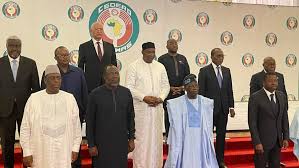Global Issues
ECOWAS And The Coup In Niger –By Chibuzor Iloamachi
This is the first time in recent years that ECOWAS has considered the use of force to intervene and restore democracies in countries where a Military coup has occurred. However, in 2017 ECOWAS used force to restore order In Gambia, a Member Country after longtime President Yahya Jammeh’s refusal to step down when he lost the presidential election.

‘We must stand firm on democracy. There is no governance, freedom or rule of law without democracy. We will not accept coup after coup in West Africa again. Democracy is very difficult to manage but it is the best form of government’. – President Bola Tinubu
Niger’s President Mohamed Bazoum was ousted from office by a group of soldiers’ hours after members of his Presidential guards detained him at the presidential palace in the state capital, Niamey, throwing the Country into Political Turmoil. The Military announced that all institutions are suspended; land and air borders closed and also placed a curfew all over the country.
President Mohamed Bazoum on the other hand has refused to resign and has support from not only western nations but also Within ECOWAS. President Bazoum was the first elected leader to succeed another in Niger since Independence in 1960.
Niger is the largest country in West Africa and is a key part of the African region known as the Sahel – a belt of land that stretches from the Atlantic Ocean to the Red sea. Strategically, also hosting US and French military bases and is seen as a key ally in the Fight against Terrorism in the region.
Economically, it is Rich in Uranium producing 7% of the World supplies. However, Nigeriens are among the poorest people on earth. According to the Coup plotters rising insecurity and a lack of economic growth were their major reasons for the Coup saying the intervention was necessary to avoid “the gradual and inevitable demise” of the country.
The Economic Community of West African States (ECOWAS) at an Emergency meeting in Abuja, Nigeria on 30 July demanded the immediate release and reinstatement of Niger’s elected President, Mohamed Bazoum. The regional Bloc gave the Military in Niger a one-week ultimatum to comply and warned it would take all measures necessary including force to restore constitutional order. The regional bloc also imposed sanctions which included closure of land and air borders between ECOWAS countries and Niger, Institution of ECOWAS No fly Zone on all commercial flights to and from Niger, Suspension of all commercial and financial transactions between ECOWAS members and Niger. Freezing Niger’s assets in ECOWAS Central bank and imposing a travel ban and asset freeze for the Military officials involved in the coup attempt.
This is the first time in recent years that ECOWAS has considered the use of force to intervene and restore democracies in countries where a Military coup has occurred. However, in 2017 ECOWAS used force to restore order In Gambia, a Member Country after longtime President Yahya Jammeh’s refusal to step down when he lost the presidential election.
ECOWAS also operated as a Regional peacekeeping mission known as ECOMOG that was led by Nigeria in 1990s and early 2000s to help restore order in Sierra Leone and Liberia.
Presently ECOWAS as a regional bloc is also very much interested in the Niger coup because of Insurgency in the Sahel and political stability in the Region. Niger lies on the Sahel region which is an important Route in curbing illegal Migration to Europe. Also the Niger River is so important in the region because the river is used for irrigation, power production in Nigeria and transportation. Nigeria which is Africa’s most populous nation also shares 1007km border line with Niger, Given the close geographical Proximity and historical ties between Niger and Nigeria, political instability in Niger has the potential to affect Nigeria’s political stability and security which can implode the West African Region and African Continent in general. These situations can have drastic consequences leading to cross border conflicts and migrant crisis.
Democracy must be protected in Niger but dialogue and Heavy Sanctions remain the best option for now. A use of force by sending armed troops will result in causalities especially now that Burkina Faso, Mali, Guinea have declared support for the Niger Coup. Diplomatic solution is the best way to resolve this Crisis. I support ECOWAS to send highly renowned delegates to talk to the Coup plotters to see a reason to give back power to a legitimate government that was chosen by the votes of the people. Also Niger should be suspended from ECOWAS and aid from European countries should be halted to Niger. The best way to bring back democracy back to Niger is to get the Nigeriens to support democracy and let the Military see the people turning away from supporting Military rule. Only then will democracy be returned.










